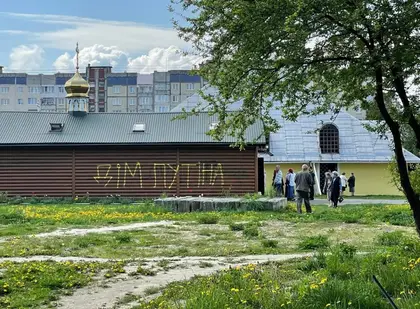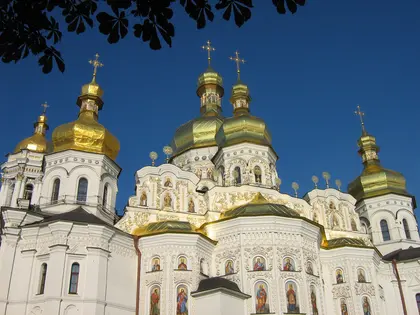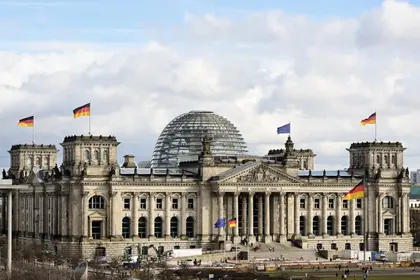A historic first visit took place between Pope Francis and the Primate of the Orthodox Church of Ukraine (OCU) Metropolitan Epifaniy earlier in the month. The head of the independent Ukrainian church thanked the Pope for his humanitarian efforts and stressed the importance of his peace prayers and those of millions of Christians worldwide.
Over four days, the Ukrainian church representatives engaged in a packed itinerary that included various cities and regions in Italy. The Vatican endorsed the trip and facilitated the delegation’s access to key sites, such as the Papal Basilica of Saint Nicholas in Bari (Puglia), allowing the Metropolitan of Kyiv to preside at a Holy Liturgy there. Metropolitan Epifaniy also held a peace prayer at Rome’s Greek Orthodox Church of St Theodore, under the Ecumenical Patriarchate, indicating the carefully coordinated preparation for his visit. However, this otherwise meticulously planned trip was overshadowed by one unexpected issue – the Vatican’s media blackout.
JOIN US ON TELEGRAM
Follow our coverage of the war on the @Kyivpost_official.
Despite its significance, the meeting between the Pope and Epifaniy on Dec.13 received no coverage in Vatican media. According to the Italian newspaper Il Messaggero, journalists were told this was because it was considered a private meeting. The Vatican News website, which is the central hub for the Vatican’s online news content and the official daily bulletin of the Holy See press office, didn’t mention the OCU’s visit at all. This quietness was evident across social media as well and had a cascading effect as the prominent Catholic and international news sources didn’t write about it.

Ukrainian Drones Hit Missile Arsenal, Key Russian Oil Facility in Russia’s Tver Region
The Vatican’s media communication regarding the Pope’s activities is known to be diligent and prompt. It goes without saying that the Vatican news service is an important force in shaping the global perception of the Catholic church. It offers content in 40 languages. Errors or oversights of this magnitude are not a plausible explanation, as the visit wasn’t mentioned in any official channel.
The Ukrainian side regularly reported on the event at the state level, through its ambassador to the Holy See, Andriy Yurash, who described the meeting as “warm and incredibly sincere.” The Orthodox Church of Ukraine also issued detailed statements and photographs of the visit.
For comparison, Vatican News reported the Pope’s meetings with Metropolitan Anthony, who leads the Russian Orthodox Church’s Department for External Church Relations, in July 2024 and May 2023.
Why has the Vatican chosen to remain silent on this occasion?
The Vatican still sees the Ukrainian Orthodox landscape divided and fragmented between the OCU and the Ukrainian Orthodox Church (UOC) under Metropolitan Onufry. Publicizing the visit would have signaled that the Pope fully supports Metropolitan Epifaniy and sides with the OCU on all issues, including the most pressing intra-Orthodox split, which weighs heavily on the Orthodox church.
While OCU received an autocephaly from the Ecumenical Patriarchate in 2019, several Orthodox churches (Romanian, Serbian, and Bulgarian, to name a few) still refuse to recognize its validity. Any meddling in internal Orthodox issues, such as the Ukrainian church question, would be seen as overstepping.
While the visit was undoubtedly received favorably in Constantinople (Istanbul), where the Ecumenical Patriarch sits, Moscow remains part of the puzzle for building and nurturing ecumenical relations. Pope Francis has invested considerable effort in maintaining open channels with Patriarch Kirill of the Russian Orthodox Church, because the Vatican views this relationship as a crucial element of the ecumenical landscape.
Pope Francis has invested considerable effort in maintaining open channels with Patriarch Kirill of the Russian Orthodox Church, because the Vatican views this relationship as a crucial element of the ecumenical landscape.
Russia’s full-scale invasion of Ukraine has already altered the dynamics of this relationship. The Apostolic nuncio to the Baltic states, Archbishop Georg Gänswein, recently stated that the “war has disrupted ecumenical relations, particularly with the Orthodox Church, where many priests have distanced themselves from the Moscow Patriarchate.”
The schism between Moscow and Constantinople shows no signs of mending. The Russian Orthodox Church has cut ties with the Ecumenical Patriarchate over its involvement in the Ukrainian church question, which Moscow considered its “exclusive right.” Therefore, the Pope doesn’t want to insert himself between Moscow and Constantinople.
While avoiding the autocephaly question, the Pope has sought to navigate his position on the war in Ukraine carefully. He has often faced criticism for his “political neutrality,” which he views as necessary to advance certain peace initiatives under his leadership, such as POW exchanges and the return of Ukrainian children abducted and taken to Russia.
When it comes to Ukrainian domestic politics, the Pope criticized the law on the ban of the Russian Orthodox Church in Ukraine and its effects on the Moscow-linked UOC by stating that “no Christian Church be abolished directly or indirectly.” The Vatican still considers this to be an important and ongoing question. It was one of the topics of discussion that Cardinal Kurt Koch, president of the Dicastery for Promoting Christian Unity, enquired about at the meeting with the Ukrainian delegation, which followed after the meeting with Pope Francis. The Pope wants to exercise some leverage here, knowing that Metropolitan Epifaniy’s church benefits from the transition of church communities (from UOC to OCU).
Lastly, there have been many Russian malign efforts in the past to exploit the Vatican’s interest in Orthodox affairs as well as the Pope’s ecumenical initiatives for propaganda purposes. This has especially been the case with the 2019 granting of autocephaly, allegedly a cover-up for “destroying the UOC” and ultimately merging it with the Ukrainian Greek-Catholic church.
Reinforcing such unproductive conspiracies could jeopardize the ongoing ecumenical momentum, particularly with the 1,700th anniversary of Nicaean Council approaching next spring.
It is questionable whether the Vatican’s decision to silence the meeting between the Pope and Metropolitan Epifaniy has achieved its intended outcome.
It is questionable whether the Vatican’s decision to silence the meeting between the Pope and Metropolitan Epifaniy has achieved its intended outcome. Russian media have already labelled the meeting a “betrayal,” and the meeting undoubtedly serves as a strong signal of support for the leader of the OCU, regardless of whether the Vatican press covers it.
However, the Pope knows that Trump’s arrival in the White House is imminent and has already signaled support for Trump’s engagement in Ukraine. Furthermore, serious discussions have been ongoing about adopting a standard Easter date with the Ecumenical Patriarch, which Moscow hasn’t yet torpedoed.
Therefore, the Vatican pursued a more discreet approach to fostering its relationship with Epifaniy and the OCU, showing restraint before crucial new political and ecumenical momentum unfolds.
Dr. Andreja Bogdanovski is a Skopje-born freelance writer based in Edinburgh, specializing in Orthodox affairs.
You can also highlight the text and press Ctrl + Enter










